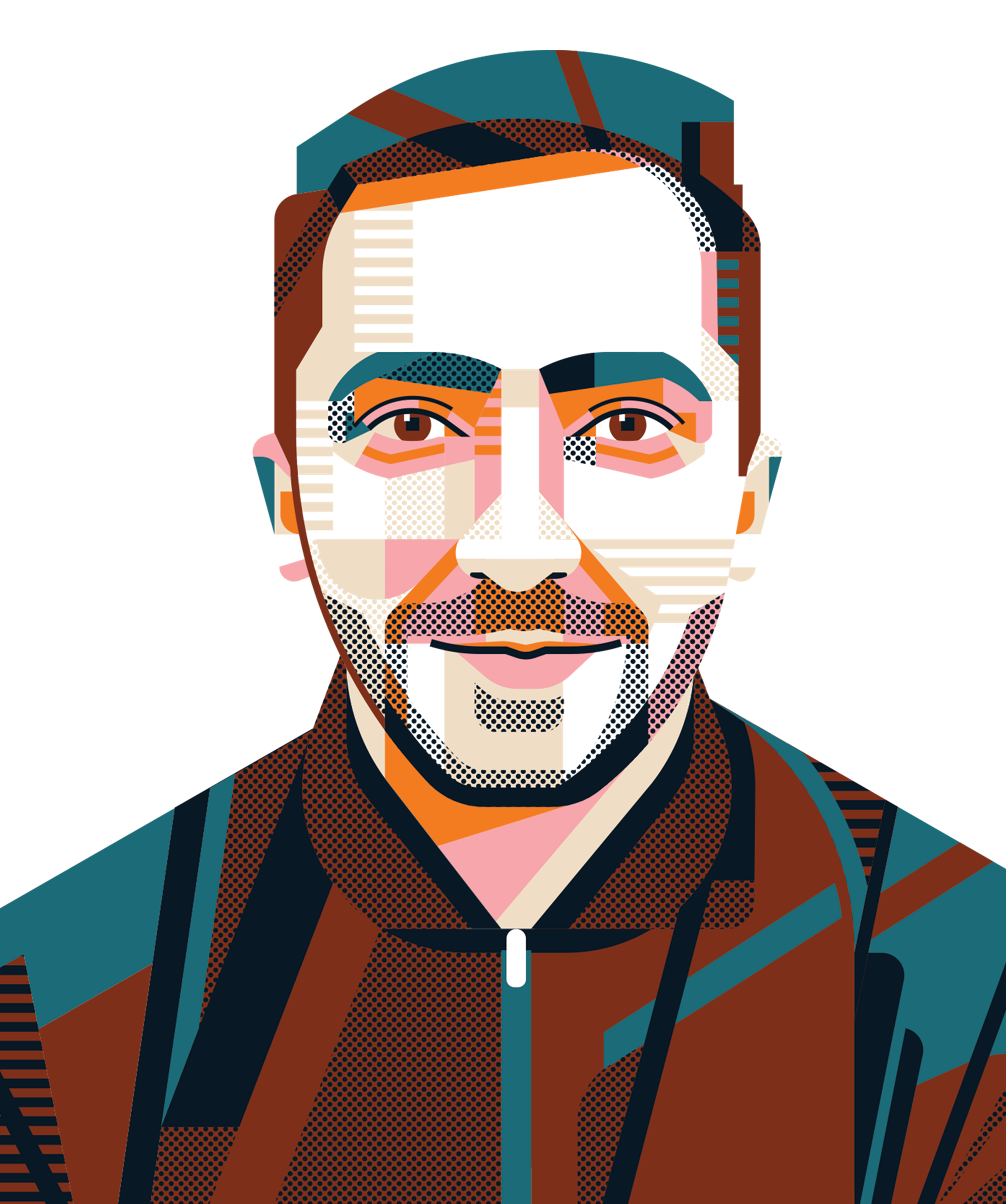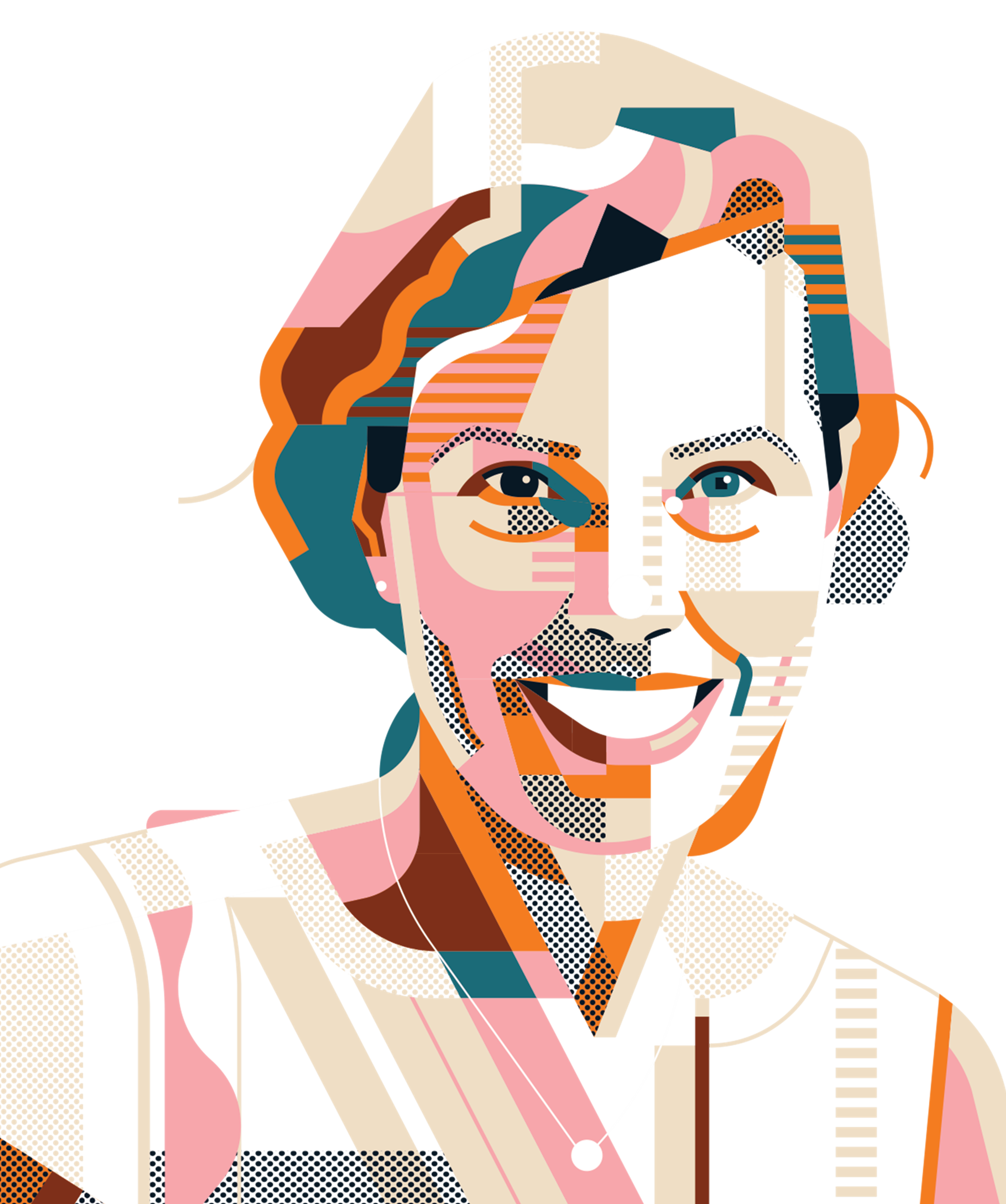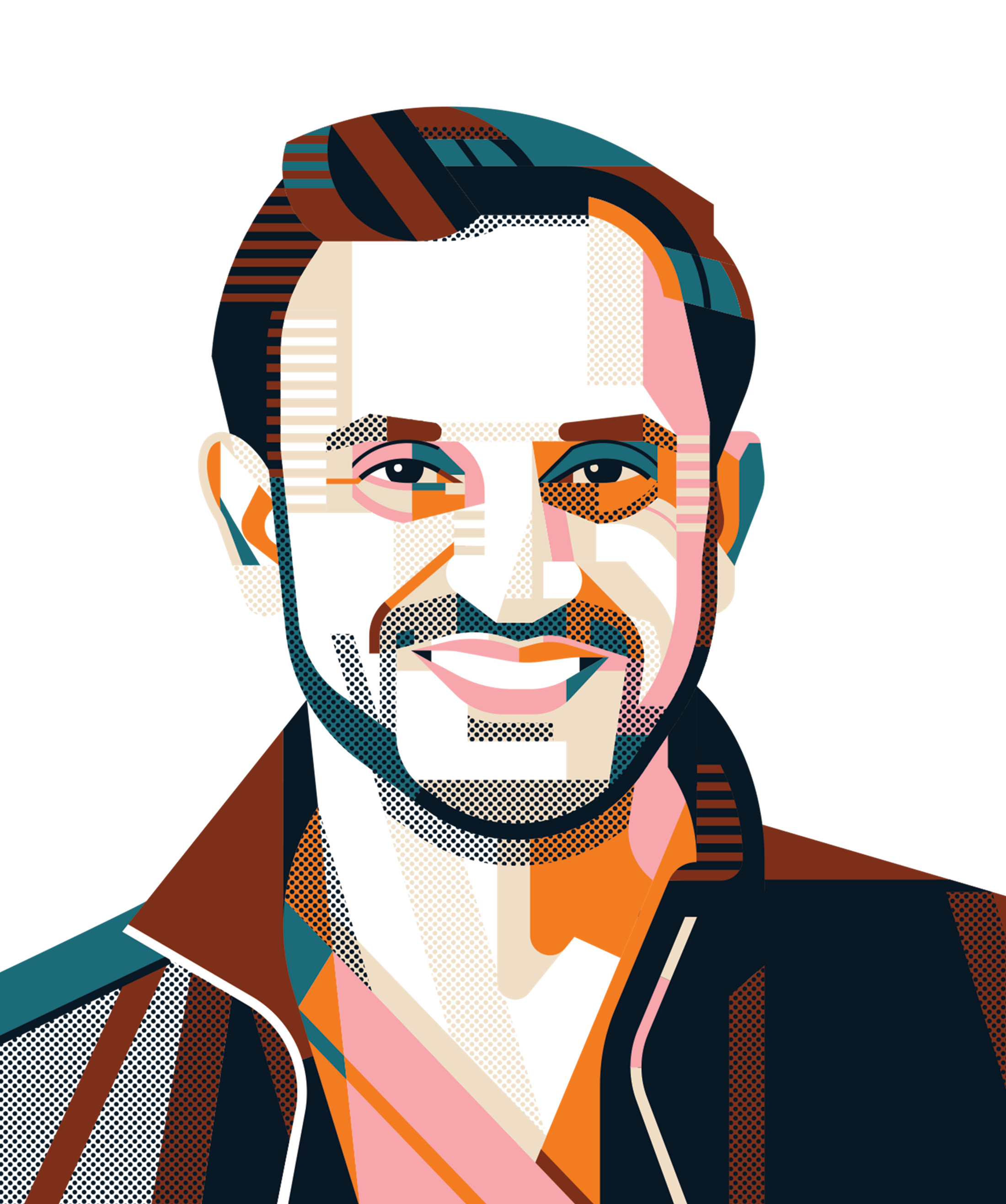Resale revolution
Omar Itani — Lebanon

Omar Itani — Lebanon
Sometimes rejection sparks the best business ideas. That was the experience of 25-year-old Omar Itani, whose struggle to offload some old clothes turned into an award-winning social enterprise that has revolutionised the second-hand clothing market in Lebanon.
In December 2016, the then-industrial engineering student offered a bag of old clothes to his building concierge, who rejected them. Itani then tried to take them to an NGO supporting Syrian refugees, but they also turned him away, saying they didn’t have the capacity to sort or properly distribute the items. They favoured the import of pre-packaged donations – or new items – from overseas because it was easier and cheaper to process.
Frustrated by seeing the demand for clothing, while also knowing how much was ending up in landfill, Itani set out to bridge the gap in the market. With the help of friends, he began collecting used clothes, which were sorted depending on size and style, and distributed to households in less well-off neighbourhoods in the city.
“It just didn’t make sense to me that you would collect clothes in wealthy parts of London to distribute in poor parts of Lebanon,” he explains. “Why not just collect clothes in Lebanon to distribute in Lebanon? It costs less, you have better control over quality, you reduce waste, and you reduce carbon footprint.”
Some months and many bags of clothes later – and under pressure from his exasperated mother who had grown weary of their home being filled with donations – Itani secured $2,500 of seed funding through a local competition.
This enabled him to move into dedicated premises, and FabricAID, the region’s first upcycling and clothing redistribution hub, was born.
FabricAID collects, cleans and sorts clothes and then sells them items on at micro prices (maximum $2) at its three shops or via pop-up stalls in local markets. The items are marketed at lower-income Lebanese, as well as the many Palestinian and Syrian refugees living in Lebanon.
In addition to providing affordable clothing, the initiative creates jobs. It is also going some way to reduce Lebanon’s landfill crisis by repurposing items that would otherwise have been thrown away.
“The way we manage the selling is a very important aspect,” Itani says, explaining how the clothes are hung-up neatly, and that there are changing rooms, mirrors, and staff on hand to help.
“We want people to be able to access affordable clothes in a dignified manner without feeling that somebody is doing charity for them.”
In its first two years, FabricAID collected more than 120 tonnes of clothing and has so far sold more than 90,000 items. In addition to receiving corporate donations from fashion brands, the company now has 100 donation bins dotted around Beirut and buys unwanted clothes in bulk from local NGOs.
In July, FabricAID opened SecondBase, a vintage shop in Beirut’s trendy Gemmeyze district, to sell higher-end items or pieces that may not be culturally appropriate for more conservative shoppers.
Tragically, after fewer than two months of operations, the store was destroyed in the Beirut port explosion. It is now being rebuilt and Itani says a second such outlet will open soon.
In 2020, turnover was forecast to be $750,000 and the company has made moves to open a branch in Jordan, where there is also a large community of Syrian refugees and a market for affordable clothes.
From a volunteer project begun organically by a group of friends, FabricAID now has 25 full-time and 80 part-time staff. In 2019 Itani was named a United Nations Young Champion of the World for his efforts to reduce fashion’s carbon footprint and cut clothing waste. He has also received the Denis Pietton Award from the French Embassy in Lebanon.
Although Covid-19 movement restrictions have presented some logistical challenges (including a delay in the opening of the SecondBase shop) Itani says that overall the financial crisis in Lebanon had not been a problem for FabricAID. In fact, he says the weakness of the local currency against the US dollar has reduced imports and “paved the way for a much bigger market especially with the general reduction in purchasing power”.
Getting financing to move the business from the seed to start-up stage, however, was a major headache. In an effort to raise capital, he and his team took part in almost 20 different funding competitions, winning in total $130,000, and taking first place in the 2018 Global Social Venture Competition hosted by Berkley University in the US.
Things are getting easier. In 2018, FabricAID was accepted into the portfolio of the Middle East-focused Alfanar Venture Philanthropy, which has invested $109,000 in the business.
This money has supported the purchase of a pick-up truck to increase the volume of clothes collected, an industrial washing machine, a baling machine and a shredder.
The engagement with Alfanar has also helped FabricAID build new partnerships and develop RemAid, a new arm of the business. It sells on damaged goods for use as upholstery padding in collaboration with other charities, or to fashion students and NGOs who upcycle the fabric, making clothes they can sell on.
Itani turned his back on a lucrative engineering career to launch FabricAID but he has no regrets.
“The government and the international community have failed the people of Lebanon over many years, and a lot of Lebanese feel they have no choice but to leave,” he explains. “But this is my country and I don’t want to leave.
"I want to do what I can to make a difference because I refuse to accept the situation as it is.”
“We want people to be able to access affordable clothes in a dignified manner.”

Heidi Christ — Geneva
When Syrian refugee Amal fled to Jordan in 2012, she brought little more than a suitcase. But she also came with a diploma in fine art and ambitions of turning her skills into a career.
Today, she’s one of more than 2,600 refugees selling handcrafted products through MADE51, a platform created in 2018 by the UN refugee agency, UNHCR, to support displaced artisans and give them new ways to sell goods to a global audience.
“The artisan sector is the second-largest employer in the developing world, behind only agriculture,” says Heidi Christ, senior livelihoods officer with UNHCR, and the brains behind the project. “Artisan businesses generate income and provide important skills development, especially to women. It was a global value chain that refugees could participate in.”
MADE51, which takes its name from the 1951 Refugee Convention, links refugee artisans with local social enterprises working in the craft sector. Under its model, the social enterprises pay refugees a wage and work with them to hone their skills and get a product line up and running. In exchange, the social enterprises gain technical expertise, supply chain support and access to global markets under a UNHCR-backed brand name.
The designs – which span from brightly woven lampshades made by Malian refugees, to beaded bangles from South Sudan, and crocheted dolls by Syrian refugees in Lebanon – are then sold through MADE51’s online shop, and through tie-ups with high-end stores around the world.
“These products reflect the skill, heritage and traditions of refugees – elements that, because of their displacement, often get lost,” says Christ. “They change the perception of refugees and show them to be talented contributors.”
There are other benefits too. Refugees face huge barriers in finding work, ranging from legal restrictions, to hostility from residents who fear losing out on scarce employment opportunities. By working with local social enterprises to create new jobs, MADE51 gives refugees a means to earn an income and also pays back into the host community.
“When you look at livelihoods opportunities for refugees they often come at the expense of host community members,” says Christ. “We wanted to support local business growth, but to do it in an ethical way.”
Retail stores and websites carrying products from remote artisans isn’t a new concept, but the sheer scale of MADE51 makes it unusual. The platform is currently active in 16 countries across Africa, Asia and the Middle East, including Jordan, Lebanon, Afghanistan and Pakistan.
By the end of 2019, the latest available statistics, MADE51 had vetted and enlisted 22 social enterprises and had more than 2,600 refugee artisans – most of them women – on its books. By 2030, it aims to have aided 300,000 refugees worldwide.
In 2019, MADE51 items generated total revenues of $283,275 through sales of refugee-made products at major retail chains including Virgin Megastores, West Elm, Anthropologie and Urban Outfitters.
Looking ahead, the platform plans to develop a range of new technological solutions to better support participating social enterprises. These include a production management app; artisan payment and sales volumes tracking; and data analytics to better understand the reach of the brand within and beyond the retail sector.
“If we could really get big businesses involved, MADE51 could be a way to show host country governments the benefits of allowing refugees to work and grow the local economy,” Christ says.
For refugees like Amal, the benefits of the platform go beyond earning an income. The 31-year-old discovered MADE51 through the Social Enterprise Project (SEP), an organisation that supports refugees in Jordan with training and employment.
Under the initiative, which operates near her home in Jerash, refugees produce delicately hand-embroidered accessories with geometrical patterns, inspired by architecture of Palestinian and Syrian heritage.
Amal, who is one of almost 500 women producing the embroidery, says the project has given her hope.
“Being a part of this has changed how I think,” she says. “Doing the work and embroidery gives my mind something else to focus on. While I’m creating, I don’t think about all the other problems in my life. I’ve learned so many things about myself, how to be patient or determined.”
The earnings from her designs are not yet enough for her family to live on, but she’s hopeful of eventually being able to give her two-year-old son a bright future.
“I want to tell our customers that they are ordering something unique,” she says. “These are products that are based on our history and culture. Every stitch that we make means something.”
“MADE51 could be a way to show governments the benefits of allowing refugees to work.”

Mohamed Aburawi — Libya
When faced with Libya’s crumbling public healthcare service, a system battered by years of corruption and conflict, Mohamed Aburawi knew it was beyond repair. So the doctor-turned-tech entrepreneur decided to create a new one, online.
Speetar, meaning hospital in Libyan Arabic, is a web-based platform enabling physicians overseas from the Arab diaspora to provide telehealth consultations to people living in Libya.
In a country where travel is risky due to insecurity and poor roads – and where the availability of doctors, especially specialists, is limited – Speetar plugs a gap for millions of low-earning Libyans by offering access to quick and expert advice.
“The idea was to build a network of skilled specialists, wherever they are located, who understood the language and context of the country,” says Aburawi. “I’m passionate about Libya and about meeting the needs there, and telemedicine was an opportunity to do that.”
Speetar started out in 2016 with about 100 volunteer doctors and a test group of 500 patients. Today, it hosts more than 1,000 medical providers in its network and covers a patient population of nearly 50,000 across Libya. Doctors either offer their time pro bono as a service to their countrymen, or are compensated by the Libyan health authority, with whom Speetar works closely.
Consultations are available in a range of specialisms, from mental health, oncology and radiology, to paediatrics and family health.
Appointments are beamed over video calls on the platform’s mobile or web app, with patients referred to clinics or laboratories for testing or further treatment.
The portal also provides patients with e-prescriptions and details of local pharmacies that have the medication in stock, and is working to digitise centrally held patient records.
“I want to see someone in a village in the south of Libya have the same access to quality care as a person living in Boston, because both of them are human,” says Aburawi. “Healthcare, preventive care, child and mother care – all that should be a right.”
Aburawi grew up in the city of AlKhums and studied medicine in Tripoli. He had been due to graduate in 2011, when political protests against the long-standing leader Col Gaddafi turned violent.
When lectures and exams were cancelled, many of his peers fled to neighbouring countries, but Aburawi stayed on and helped set up a field hospital to treat victims of the violence.
After eight months, and under pressure from his family, Aburawi took up an internship in Cairo before securing a fellowship at Harvard Medical School in the United States. But the plight of Libya continued to nag at him as he watched the flow of medics fleeing the country.
“I knew that I wanted to go back, but going back as just one physician? That wasn’t going to be enough,” he says. “I couldn’t create the systemic change that I knew Libya and other countries in the region needed.”
The idea for Speetar was brought to life at the MIT Hacking Medicine hackathon in 2016, where Aburawi and his team were awarded a financial grant of $25k to develop the concept further.
That early success attracted more seed funding from the MIT Sandbox Innovation Fund, as well as the Social Innovation and Change Initiative at the Harvard Kennedy School. With $80k behind it, Speetar formally launched in 2019.
“The idea was to launch in Libya and use it as a testbed before expanding out to other countries throughout the region where there are similar needs,” says Aburawi.
Speetar is regulated by, and works closely with, the Libyan health authorities, granting it easy access to Libya’s network of hospitals and clinics, pharmacies, payment partners and telecom companies. This support enables Speetar to streamline digital processes between these entities and also offers an official seal of approval as a legitimate nationwide platform.
This partnership – and Speetar’s agility as a digital provider – made it a natural partner for the national ministry of health when Covid-19 struck. Through a new Speetar Covid-19 app, running alongside the original platform, Aburawi and his team are on the frontline of supporting Libyans to protect themselves against the coronavirus, from sharing information about symptoms, to advising which patients need to go to a hospital and who should continue to self-isolate at home.
“Since launching in May, we’ve had 5,000 downloads [of the Covid-19 app] in less than a month, and now we are approaching 10,000 with numbers still increasing,” Aburawi says. “It was a vital product for us: we developed it as a nonprofit initiative to assist the government.
In many ways, the poor state of Libya’s healthcare has helped spur Speetar’s rapid growth, and Aburawi believes this is why the model will work in other countries too.
“In Africa and other developing countries, technology can be leveraged much faster because there are few existing systems and you can skip the need to integrate within those systems,” he explains, adding that he hopes to roll the service out in Egypt, Tunisia and Pakistan.
“In a way, what we are doing is creating a new system through our collaboration with the government, healthcare workers and the public.”
Since its launch, Speetar has managed to grow its business through equity-free grants from various organisations, including $100k from the Islamic Development Bank and $150k from the Islamic Development Bank. Looking forward, Aburawi is planning to raise $1.5m at a seed round to further finance its growth.
As a doctor himself, Aburawi knows nothing can replace a face-to-face consultation, but in countries where health systems are strained and attending a clinic is either too risky or too expensive, he believes a set-up like Speetar offers a low-cost way to care for people in their homes.
“Telehealth isn’t about making doctors obsolete, it’s about automating and streamlining the mundane processes, freeing up time and energy for what’s really needed,” he says. – PA
“I want to see someone in a village in the south of Libya have the same access to quality care as a person living in Boston.”